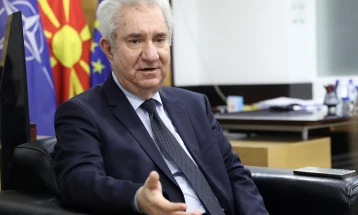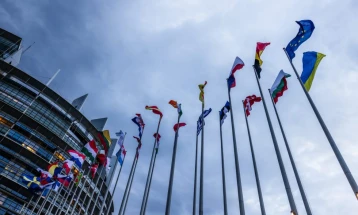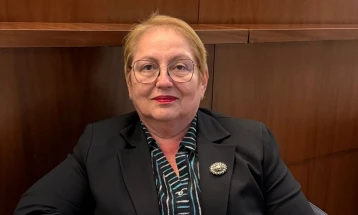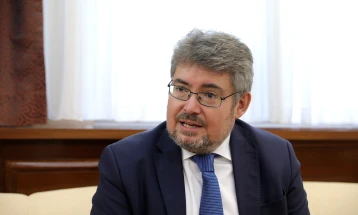Road control increased, citizens are safer as number of car crashes drops
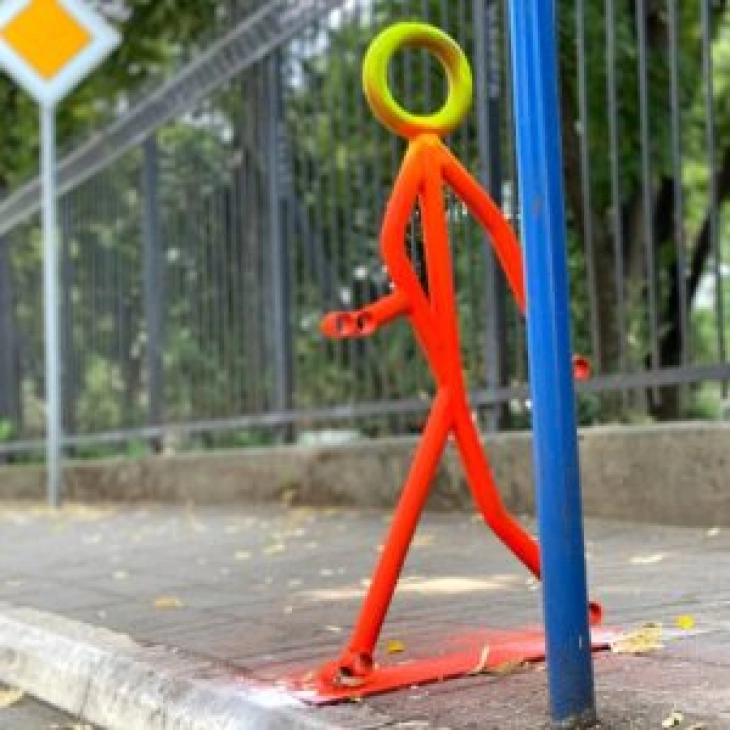
Skopje, 7 June 2021 (MIA) - A total of 7,223 traffic collisions were recorded in 2020 in North Macedonia, costing 125 people their lives. In comparison to 2019, there is a 6% decrease in traffic collisions, whereas in comparison to 2013, there is a 35% decrease.
Interior Minister Oliver Spasovski shared the official stats on his Facebook profile, adding that a series of operative actions commenced since his return to the Interior Ministry (MoI) to improve citizen safety, one of them being to improve traffic safety, which resulted in the decrease of the number of severe traffic collisions.
In January 2021, he writes, there is a 56% decrease in comparison to January 2020.
 Spasovski announced that they’re working on a blackspot map – a map of the places where severe traffic collisions occurred in 2020.
“The Ministry of Internal Affairs remains dedicated to our task to prevent with intensive measures and activities in order to reduce this number, and our January stats tell us we’re on the right track,” Spasovski’s Facebook post says.
The MoI says daily that strengthened controls are continuously ongoing, but they appeal to the citizens to follow traffic rules and regulations and to drive responsibly.
Spasovski announced that they’re working on a blackspot map – a map of the places where severe traffic collisions occurred in 2020.
“The Ministry of Internal Affairs remains dedicated to our task to prevent with intensive measures and activities in order to reduce this number, and our January stats tell us we’re on the right track,” Spasovski’s Facebook post says.
The MoI says daily that strengthened controls are continuously ongoing, but they appeal to the citizens to follow traffic rules and regulations and to drive responsibly.
 The increased presence of police officers, the MoI actively enforcing the laws, as well as the coronavirus pandemic have contributed to the positive trend in the statistics, says Stojche Stamenkovski, former president of the Republic Council on Road Traffic Safety.
He deems that the repressive measures yield results in elevating road safety.
“The fact of the matter is that elevating road safety is in the MoI’s focus during this time, and this activity is visible and yields results. There are police officers on the roads. Strengthened activities by authorities to apply the laws is good and it deserves a salute. Repression is one of the key pillars to reduce the number of collisions, and if we follow this practice and work on improving the legal regulations long-term, we can achieve satisfactory statistical parameters that will be close to the ones in the EU,” Stamenkovski tells MIA.
When it comes to the pandemic and its impact on road traffic safety, he says that it probably affected the number of traffic collisions, but it’s difficult to say.
Reducing the traffic volume does influence this reduction, Stamenkovski says, but we can’t disregard the curfew that has led to driving with increased speeds on roads and highways.
“I’m pleased by the fact that the pandemic affected urban mobility and using bikes and other alternative ways to participate in traffic,” he says.
In North Macedonia, in 2020 there were 62.5 traffic collision casualties per 1 million people.
The increased presence of police officers, the MoI actively enforcing the laws, as well as the coronavirus pandemic have contributed to the positive trend in the statistics, says Stojche Stamenkovski, former president of the Republic Council on Road Traffic Safety.
He deems that the repressive measures yield results in elevating road safety.
“The fact of the matter is that elevating road safety is in the MoI’s focus during this time, and this activity is visible and yields results. There are police officers on the roads. Strengthened activities by authorities to apply the laws is good and it deserves a salute. Repression is one of the key pillars to reduce the number of collisions, and if we follow this practice and work on improving the legal regulations long-term, we can achieve satisfactory statistical parameters that will be close to the ones in the EU,” Stamenkovski tells MIA.
When it comes to the pandemic and its impact on road traffic safety, he says that it probably affected the number of traffic collisions, but it’s difficult to say.
Reducing the traffic volume does influence this reduction, Stamenkovski says, but we can’t disregard the curfew that has led to driving with increased speeds on roads and highways.
“I’m pleased by the fact that the pandemic affected urban mobility and using bikes and other alternative ways to participate in traffic,” he says.
In North Macedonia, in 2020 there were 62.5 traffic collision casualties per 1 million people.
 The EU average for 2020 is 42 casualties per million people. Sweden is the record setter for the lowest traffic mortality rate with 18 casualties per 1 million people, and Romania is the worst ranked with 85 casualties per 1 million people.
Adina Valean, European Commissioner for Transport, recently pointed out that with 4,000 less casualties as opposed to 2019, the EU’s roads are the safest in the world, but we are still far from our goals and we need to work together to achieve them.
“In our strategy for smart, sustainable mobility, we repeated our efforts to establish the road safety strategy in the EU and reducing the number of victims for all forms of transport that counts victims close to zero,” she says, and this is also on the European Commission’s official website.
When asked how our country can achieve EU’s average, Stamenkovski answers that we’re missing the improvement of traffic prevention and education in the whole system of traffic safety, as well as uniting all segments of traffic safety in one leading body, and this is something to work on. He believes that forming such a body to promote traffic safety will yield the desired effects. He points out that this is what the EU has been providing as a task in every road safety report.
“The four elements of building a safe system are: safe roads, safe speeds, safe vehicles and safe, educated traffic participants. Achieving the EU’s average and a serious, visible and sustainable progress for elevating road safety can only be achieved if we continuously improve all four elements,” Stamenkovski concludes.
The RCRTS marked Global Road Safety Day last month, and on their website they say that the consequences from traffic collisions are severe, and our common obligation, the mutual and general interest of all citizens is to elevate traffic culture on a higher level. Promoting the culture, ethics and tolerance in traffic will significantly contribute to a safer, calmer traffic, it will contribute to less traffic collisions, less traffic and less victims on the streets and roads.
“Let’s improve traffic culture, let’s change bad traffic habits, starting with ourselves, and let’s support safer traffic through personal examples and a positive contribution. Be careful, responsible, well-behaved and tolerant traffic participants, today and every day!” the RCRTS appeals.
Cvetanka Minovska
Translated by Dragana Knezhevikj
The EU average for 2020 is 42 casualties per million people. Sweden is the record setter for the lowest traffic mortality rate with 18 casualties per 1 million people, and Romania is the worst ranked with 85 casualties per 1 million people.
Adina Valean, European Commissioner for Transport, recently pointed out that with 4,000 less casualties as opposed to 2019, the EU’s roads are the safest in the world, but we are still far from our goals and we need to work together to achieve them.
“In our strategy for smart, sustainable mobility, we repeated our efforts to establish the road safety strategy in the EU and reducing the number of victims for all forms of transport that counts victims close to zero,” she says, and this is also on the European Commission’s official website.
When asked how our country can achieve EU’s average, Stamenkovski answers that we’re missing the improvement of traffic prevention and education in the whole system of traffic safety, as well as uniting all segments of traffic safety in one leading body, and this is something to work on. He believes that forming such a body to promote traffic safety will yield the desired effects. He points out that this is what the EU has been providing as a task in every road safety report.
“The four elements of building a safe system are: safe roads, safe speeds, safe vehicles and safe, educated traffic participants. Achieving the EU’s average and a serious, visible and sustainable progress for elevating road safety can only be achieved if we continuously improve all four elements,” Stamenkovski concludes.
The RCRTS marked Global Road Safety Day last month, and on their website they say that the consequences from traffic collisions are severe, and our common obligation, the mutual and general interest of all citizens is to elevate traffic culture on a higher level. Promoting the culture, ethics and tolerance in traffic will significantly contribute to a safer, calmer traffic, it will contribute to less traffic collisions, less traffic and less victims on the streets and roads.
“Let’s improve traffic culture, let’s change bad traffic habits, starting with ourselves, and let’s support safer traffic through personal examples and a positive contribution. Be careful, responsible, well-behaved and tolerant traffic participants, today and every day!” the RCRTS appeals.
Cvetanka Minovska
Translated by Dragana Knezhevikj
 Spasovski announced that they’re working on a blackspot map – a map of the places where severe traffic collisions occurred in 2020.
“The Ministry of Internal Affairs remains dedicated to our task to prevent with intensive measures and activities in order to reduce this number, and our January stats tell us we’re on the right track,” Spasovski’s Facebook post says.
The MoI says daily that strengthened controls are continuously ongoing, but they appeal to the citizens to follow traffic rules and regulations and to drive responsibly.
Spasovski announced that they’re working on a blackspot map – a map of the places where severe traffic collisions occurred in 2020.
“The Ministry of Internal Affairs remains dedicated to our task to prevent with intensive measures and activities in order to reduce this number, and our January stats tell us we’re on the right track,” Spasovski’s Facebook post says.
The MoI says daily that strengthened controls are continuously ongoing, but they appeal to the citizens to follow traffic rules and regulations and to drive responsibly.
 The increased presence of police officers, the MoI actively enforcing the laws, as well as the coronavirus pandemic have contributed to the positive trend in the statistics, says Stojche Stamenkovski, former president of the Republic Council on Road Traffic Safety.
He deems that the repressive measures yield results in elevating road safety.
“The fact of the matter is that elevating road safety is in the MoI’s focus during this time, and this activity is visible and yields results. There are police officers on the roads. Strengthened activities by authorities to apply the laws is good and it deserves a salute. Repression is one of the key pillars to reduce the number of collisions, and if we follow this practice and work on improving the legal regulations long-term, we can achieve satisfactory statistical parameters that will be close to the ones in the EU,” Stamenkovski tells MIA.
When it comes to the pandemic and its impact on road traffic safety, he says that it probably affected the number of traffic collisions, but it’s difficult to say.
Reducing the traffic volume does influence this reduction, Stamenkovski says, but we can’t disregard the curfew that has led to driving with increased speeds on roads and highways.
“I’m pleased by the fact that the pandemic affected urban mobility and using bikes and other alternative ways to participate in traffic,” he says.
In North Macedonia, in 2020 there were 62.5 traffic collision casualties per 1 million people.
The increased presence of police officers, the MoI actively enforcing the laws, as well as the coronavirus pandemic have contributed to the positive trend in the statistics, says Stojche Stamenkovski, former president of the Republic Council on Road Traffic Safety.
He deems that the repressive measures yield results in elevating road safety.
“The fact of the matter is that elevating road safety is in the MoI’s focus during this time, and this activity is visible and yields results. There are police officers on the roads. Strengthened activities by authorities to apply the laws is good and it deserves a salute. Repression is one of the key pillars to reduce the number of collisions, and if we follow this practice and work on improving the legal regulations long-term, we can achieve satisfactory statistical parameters that will be close to the ones in the EU,” Stamenkovski tells MIA.
When it comes to the pandemic and its impact on road traffic safety, he says that it probably affected the number of traffic collisions, but it’s difficult to say.
Reducing the traffic volume does influence this reduction, Stamenkovski says, but we can’t disregard the curfew that has led to driving with increased speeds on roads and highways.
“I’m pleased by the fact that the pandemic affected urban mobility and using bikes and other alternative ways to participate in traffic,” he says.
In North Macedonia, in 2020 there were 62.5 traffic collision casualties per 1 million people.
 The EU average for 2020 is 42 casualties per million people. Sweden is the record setter for the lowest traffic mortality rate with 18 casualties per 1 million people, and Romania is the worst ranked with 85 casualties per 1 million people.
Adina Valean, European Commissioner for Transport, recently pointed out that with 4,000 less casualties as opposed to 2019, the EU’s roads are the safest in the world, but we are still far from our goals and we need to work together to achieve them.
“In our strategy for smart, sustainable mobility, we repeated our efforts to establish the road safety strategy in the EU and reducing the number of victims for all forms of transport that counts victims close to zero,” she says, and this is also on the European Commission’s official website.
When asked how our country can achieve EU’s average, Stamenkovski answers that we’re missing the improvement of traffic prevention and education in the whole system of traffic safety, as well as uniting all segments of traffic safety in one leading body, and this is something to work on. He believes that forming such a body to promote traffic safety will yield the desired effects. He points out that this is what the EU has been providing as a task in every road safety report.
“The four elements of building a safe system are: safe roads, safe speeds, safe vehicles and safe, educated traffic participants. Achieving the EU’s average and a serious, visible and sustainable progress for elevating road safety can only be achieved if we continuously improve all four elements,” Stamenkovski concludes.
The RCRTS marked Global Road Safety Day last month, and on their website they say that the consequences from traffic collisions are severe, and our common obligation, the mutual and general interest of all citizens is to elevate traffic culture on a higher level. Promoting the culture, ethics and tolerance in traffic will significantly contribute to a safer, calmer traffic, it will contribute to less traffic collisions, less traffic and less victims on the streets and roads.
“Let’s improve traffic culture, let’s change bad traffic habits, starting with ourselves, and let’s support safer traffic through personal examples and a positive contribution. Be careful, responsible, well-behaved and tolerant traffic participants, today and every day!” the RCRTS appeals.
Cvetanka Minovska
Translated by Dragana Knezhevikj
The EU average for 2020 is 42 casualties per million people. Sweden is the record setter for the lowest traffic mortality rate with 18 casualties per 1 million people, and Romania is the worst ranked with 85 casualties per 1 million people.
Adina Valean, European Commissioner for Transport, recently pointed out that with 4,000 less casualties as opposed to 2019, the EU’s roads are the safest in the world, but we are still far from our goals and we need to work together to achieve them.
“In our strategy for smart, sustainable mobility, we repeated our efforts to establish the road safety strategy in the EU and reducing the number of victims for all forms of transport that counts victims close to zero,” she says, and this is also on the European Commission’s official website.
When asked how our country can achieve EU’s average, Stamenkovski answers that we’re missing the improvement of traffic prevention and education in the whole system of traffic safety, as well as uniting all segments of traffic safety in one leading body, and this is something to work on. He believes that forming such a body to promote traffic safety will yield the desired effects. He points out that this is what the EU has been providing as a task in every road safety report.
“The four elements of building a safe system are: safe roads, safe speeds, safe vehicles and safe, educated traffic participants. Achieving the EU’s average and a serious, visible and sustainable progress for elevating road safety can only be achieved if we continuously improve all four elements,” Stamenkovski concludes.
The RCRTS marked Global Road Safety Day last month, and on their website they say that the consequences from traffic collisions are severe, and our common obligation, the mutual and general interest of all citizens is to elevate traffic culture on a higher level. Promoting the culture, ethics and tolerance in traffic will significantly contribute to a safer, calmer traffic, it will contribute to less traffic collisions, less traffic and less victims on the streets and roads.
“Let’s improve traffic culture, let’s change bad traffic habits, starting with ourselves, and let’s support safer traffic through personal examples and a positive contribution. Be careful, responsible, well-behaved and tolerant traffic participants, today and every day!” the RCRTS appeals.
Cvetanka Minovska
Translated by Dragana Knezhevikj 



